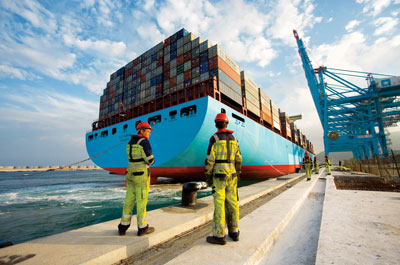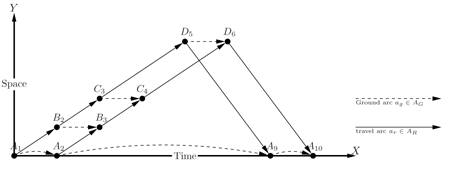by David Pisinger
While the present global climate debate is to a large extent focused on mechanical solutions like electric cars and wind turbines, such technology is expensive and time-consuming to implement. Better IT-based logistics and planning tools with a focus on the environment may be an attractive alternative, since they do not need large investments, are fast to implement, and the underlying techniques are already mature.
The EU has the goal of reducing CO2 emissions by 20% within the next decade. The transportation sector is responsible for a large proportion of these emissions because of its reliance on fossil fuel. While the very nature of the industry means the introduction of alternative energy sources is not an immediately useful option, an alternative may be found in improving logistics.
The ENERPLAN research project (Energy Efficient Transportation Planning) will develop intelligent IT-based planning tools for the containerized transportation sector, reducing energy consumption and thus environmental impact. The research project includes decision tools for planning a route network such that a higher load factor can be achieved, algorithms for filling containers and stowing vessels more efficiently, and methods for finding more efficient distribution paths. Pervasive computing methods using RFID and handheld devices are used to integrate these approaches and provide decision support in the case of sudden changes, meaning superfluous energy consumption can be avoided. To allow end customers to visualize these efforts, decision tools that highlight the environmental impact of various transportation solutions are developed, making it possible for them to choose the most energy-efficient route.

Figure 1: Algorithms for filling containers more efficiently can help reduce CO2 emissions.
The research involves cooperation between Maersk Line, DTU Manage-ment Engineering and the IT-University in Copenhagen. Being the largest container shipping company, Maersk Line provides in-depth knowledge of the problems under scrutiny, and can transform the research results into actual energy-saving initiatives that have a significant impact on CO2 emissions. The two university partners have a long experience in solving logistic problems in cooperation with industrial partners.
The goal of the project is to reduce energy consumption by 3-5% by designing more efficient route nets and improving logistic handling. For a large liner shipping company, this reduction amounts to the CO2 emissions of a major Danish city.
It has now become possible to obtain dynamic information from the Internet using handheld computers and cellular phones, such that at any time we have a complete and reliable description of all current tasks and their execution progress. This means that we can start developing robust dynamic optimization systems. Such systems need to be sufficiently fast to reoptimize a plan almost instantly, very expressive so that they can handle nearly all realistic constraints, and be able to deliver decision support to the end-user such that an appropriate trade-off can be made between the cost and robustness of a solution.
The solution method follows a number of steps. First, a demand graph is constructed which describes the expected transportation from one port to another. Routes are then constructed by use of graph algorithms which aim at finding dense subgraphs that satisfy a number of properties. The cost of the flow in the proposed route net is evaluated by solving a generalized multicommodity flow problem. Based on the solution found, bottlenecks in the route net and non-competitive transportation paths are identified, and used as input to a new iteration.

Figure 2: Time-space network with the schedule as time units. Service 1: A -> B -> C -> D -> A, vessel v1,1 departing A at time t = 1 vessel v1,2 departing A at time t = 2.
The project has been awarded a 1 million EURO grant by the Danish Agency for Science Technology and Innovation within the special program ‘Green IT’. The grant will finance two PhD and two post-doctorate positions at DTU and ITU to carry out research on mathematical optimization together with Maersk Line over a four-year period, starting in 2009.
ENERPLAN has its origin in classical optimization techniques, but brings a new dimension to the research field by also considering robustness, multi-criteria optimization, dynamic optimization and configuration. A great demand exists for dynamic decision systems, and the research will have a significant scientific impact. The solution methods and modeling techniques will be developed into prototype systems and tested on concrete customer data from the industry and government.
In classical operations research the focus has been to optimize a single criterion, typically profitability. ENERPLAN treats profitability and environmental impact as two equal objectives. Experience from other multi-criteria problems shows that a small decrease in one objective (profit) may lead to a substantial saving in the other objective (energy), resulting in a large impact for small cost. With the global focus on environmental issues intensifying, green logistics may be an important competitive parameter.
Green logistics is an often overlooked tool in the climate debate. Although green logistics cannot solve all our environmental problems, it is a necessary supplement for reaching our goals on time and should play a central role in the UN climate conference in December 2009.
Please contact:
David Pisinger
DTU Management, Technical University of Denmark
Tel: +45 4525 4555
E-mail:
Rune Møller Jensen
IT University of Copenhagen, Denmark
Tel: +45 7218 5048
E-mail:
Niels Rasmussen
Maersk Line, Network Design, Denmark
E-mail:
Tel: +45 3363 4971
Mikkel Mühldorff Sigurd
Maersk Line, Network Advanced Solutions, Denmark
Tel: +45 3363 8157
E-mail:










